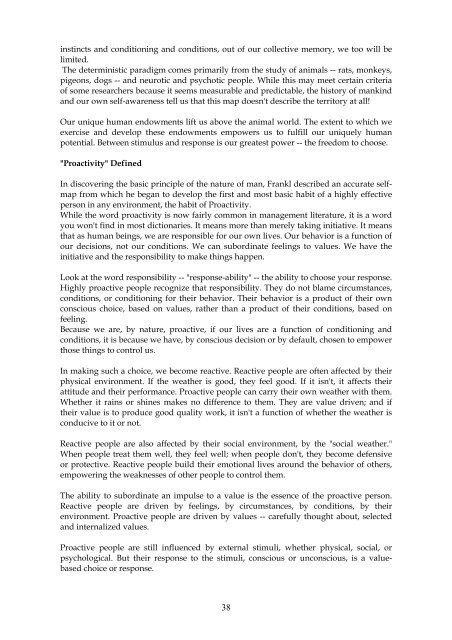Covey - The 7 habits of highly effective people
Create successful ePaper yourself
Turn your PDF publications into a flip-book with our unique Google optimized e-Paper software.
instincts and conditioning and conditions, out <strong>of</strong> our collective memory, we too will be<br />
limited.<br />
<strong>The</strong> deterministic paradigm comes primarily from the study <strong>of</strong> animals -- rats, monkeys,<br />
pigeons, dogs -- and neurotic and psychotic <strong>people</strong>. While this may meet certain criteria<br />
<strong>of</strong> some researchers because it seems measurable and predictable, the history <strong>of</strong> mankind<br />
and our own self-awareness tell us that this map doesn't describe the territory at all!<br />
Our unique human endowments lift us above the animal world. <strong>The</strong> extent to which we<br />
exercise and develop these endowments empowers us to fulfill our uniquely human<br />
potential. Between stimulus and response is our greatest power -- the freedom to choose.<br />
"Proactivity" Defined<br />
In discovering the basic principle <strong>of</strong> the nature <strong>of</strong> man, Frankl described an accurate selfmap<br />
from which he began to develop the first and most basic habit <strong>of</strong> a <strong>highly</strong> <strong>effective</strong><br />
person in any environment, the habit <strong>of</strong> Proactivity.<br />
While the word proactivity is now fairly common in management literature, it is a word<br />
you won't find in most dictionaries. It means more than merely taking initiative. It means<br />
that as human beings, we are responsible for our own lives. Our behavior is a function <strong>of</strong><br />
our decisions, not our conditions. We can subordinate feelings to values. We have the<br />
initiative and the responsibility to make things happen.<br />
Look at the word responsibility -- "response-ability" -- the ability to choose your response.<br />
Highly proactive <strong>people</strong> recognize that responsibility. <strong>The</strong>y do not blame circumstances,<br />
conditions, or conditioning for their behavior. <strong>The</strong>ir behavior is a product <strong>of</strong> their own<br />
conscious choice, based on values, rather than a product <strong>of</strong> their conditions, based on<br />
feeling.<br />
Because we are, by nature, proactive, if our lives are a function <strong>of</strong> conditioning and<br />
conditions, it is because we have, by conscious decision or by default, chosen to empower<br />
those things to control us.<br />
In making such a choice, we become reactive. Reactive <strong>people</strong> are <strong>of</strong>ten affected by their<br />
physical environment. If the weather is good, they feel good. If it isn't, it affects their<br />
attitude and their performance. Proactive <strong>people</strong> can carry their own weather with them.<br />
Whether it rains or shines makes no difference to them. <strong>The</strong>y are value driven; and if<br />
their value is to produce good quality work, it isn't a function <strong>of</strong> whether the weather is<br />
conducive to it or not.<br />
Reactive <strong>people</strong> are also affected by their social environment, by the "social weather."<br />
When <strong>people</strong> treat them well, they feel well; when <strong>people</strong> don't, they become defensive<br />
or protective. Reactive <strong>people</strong> build their emotional lives around the behavior <strong>of</strong> others,<br />
empowering the weaknesses <strong>of</strong> other <strong>people</strong> to control them.<br />
<strong>The</strong> ability to subordinate an impulse to a value is the essence <strong>of</strong> the proactive person.<br />
Reactive <strong>people</strong> are driven by feelings, by circumstances, by conditions, by their<br />
environment. Proactive <strong>people</strong> are driven by values -- carefully thought about, selected<br />
and internalized values.<br />
Proactive <strong>people</strong> are still influenced by external stimuli, whether physical, social, or<br />
psychological. But their response to the stimuli, conscious or unconscious, is a valuebased<br />
choice or response.<br />
38


